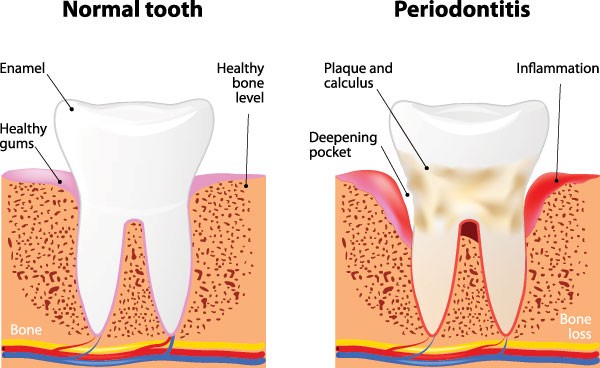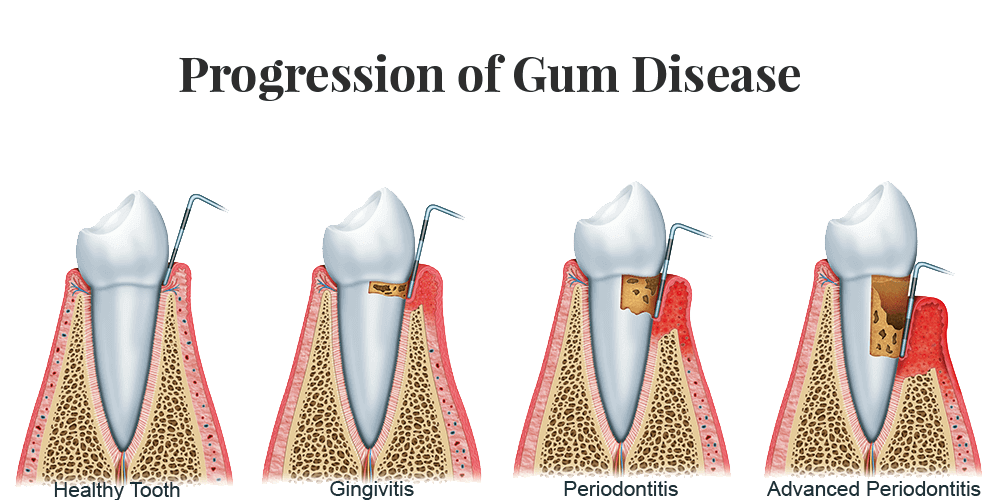Periodontal
Periodontal disease, a chronic bacterial infection, can lead to a higher incidence of bacteria in the bloodstream, circulating to various organs of the body. These bacteria can cause an increase in clot formation in arteries and tissues. Those with periodontal disease are at an even higher risk for this to occur.
Periodontal disease occurs when an infection of the gum and/or bone surrounds the tooth. Because the disease is painless, most patients are not aware that they have a problem until examined by our dentist, Dr. Rene Cabrera. With a healthy tooth, the root is formed in the jawbone with strong ligaments. This keeps the tooth tightly attached to the bone. The gums protect the bone from bacteria constantly present in the mouth. When healthy, the gum edge is higher than the fiber attachment. In turn, a space is formed around the tooth.
We all have bacteria in our saliva continuously. When these bacteria collect on all surfaces, plaque forms. If the plaque in the space underneath the gum edge is not removed, infection may occur. The longer that plaque remains on a tooth, the more problems it can cause. Once it hardens, it becomes what’s known as tartar (calculus) and must be dislodged.



Periodontal Initially
The pocket depth of the affected gum is typically only slightly deepened. To remove any calculus that has formed, scaling and root planing are done. In order to prevent discomfort, we may numb the gums to protect the tender pockets. Patients must maintain good oral habits following the procedure to keep plaque from reforming. Your oral health will return as soon as the healing gum builds back up around the tooth. Contact Us
Swollen gums that fail to shrink back to normal must be corrected with a gingivectomy. Patients will experience the same issue if this procedure is not performed.
Actual bone loss takes place in more moderate cases, where the pockets are 5-7 mm in depth. Flap surgery is usually the procedure of choice because of the difficulty in reaching the bottom of the pocket with scaling and root planing.
Health considerations that may affect susceptibility to periodontal disease.
Smoking – A host factor that can be altered, smoking greatly increases the risk of disease.
Diabetes – If not properly controlled, diabetes increases disease risk.
Stress – Long-term stress may have an adverse effect on how the disease is managed.
Hormones – Increased estrogen levels connect with an increase in gingival inflammation.
Medications – Gum overgrowth may be caused by Dilantin and some heart medications.
Genetics – Nearly 25 percent of the population is susceptible to periodontal disease. We can now conduct a test for genetic susceptibility.
Scaling and Root Planing.
A deep cleaning, also known as scaling and root planing, may be suggested if you have developed excessive plaque and tartar below the gum line. This treatment is needed to help heal periodontal disease. The procedure removes plaque and tartar from below the gum line to the bottom of each periodontal pocket. The tooth’s root surfaces are cleaned and smoothed. In some cases the dentist may indicate Arestin. This is a localized antibiotic that is easily placed in conjunction with root planing and scaling to help treat periodontal disease and promote healing.

